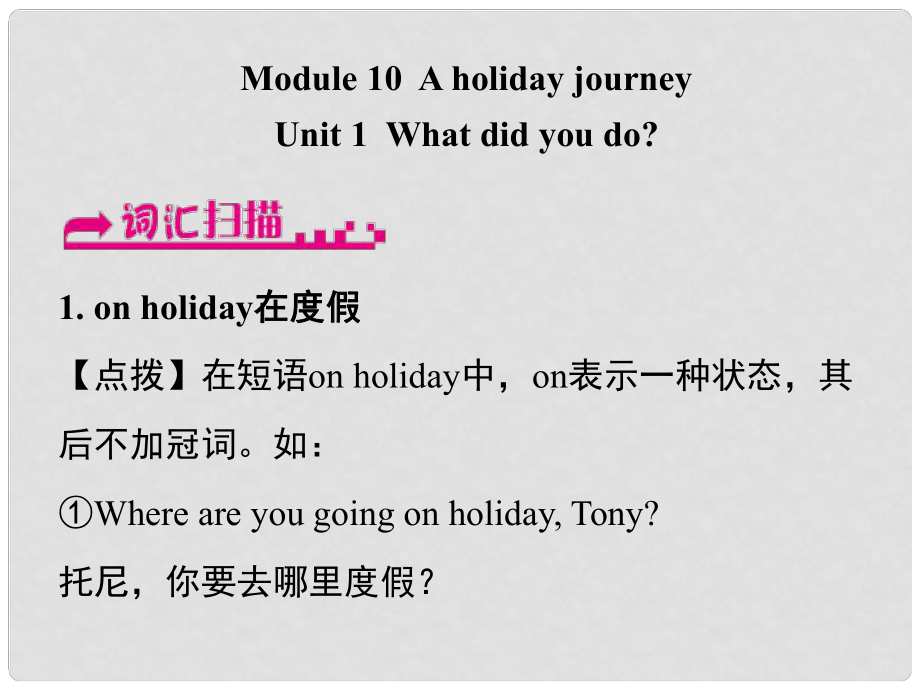《浙江省嘉興市秀洲區(qū)七年級(jí)英語(yǔ)下冊(cè) Module 10 A holiday journey Unit 1 What did you do課件 (新版)外研版》由會(huì)員分享����,可在線閱讀,更多相關(guān)《浙江省嘉興市秀洲區(qū)七年級(jí)英語(yǔ)下冊(cè) Module 10 A holiday journey Unit 1 What did you do課件 (新版)外研版(16頁(yè)珍藏版)》請(qǐng)?jiān)谘b配圖網(wǎng)上搜索����。
1、Module 10 A holiday journeyUnit 1 What did you do?1. on holiday在度假在度假 【點(diǎn)撥】在短語(yǔ)on holiday中����,on表示一種狀態(tài)����,其后不加冠詞����。如:Where are you going on holiday, Tony? 托尼����,你要去哪里度假?Mr Green is on holiday.格林先生在度假����。【延伸】(1)與on holiday類(lèi)似的有:on business出差����;on a trip在旅途中。如:My brother is on business in Shanghai.我哥哥在上海出差����。She is on a t
2、rip to Dalian.她在去大連的旅途中����。(2)與holiday相關(guān)的搭配:for a holiday去度假����;have/take/spend a holiday度假(動(dòng)詞短語(yǔ))����;a holiday of several days/several days holiday幾天的假期。I am going to Australia for a holiday.我打算去澳大利亞度假����。He spent his holiday in the countryside.他在農(nóng)村度假。This summer we have a holiday of 50 days.=This summer we hav
3����、e 50 days holiday.今年夏天我們有50天的假期。2. excited adj. 激動(dòng)的����;興奮的激動(dòng)的;興奮的【點(diǎn)撥】excited常用人作主語(yǔ)或修飾人����。常用短語(yǔ):be excited about.對(duì)感到興奮。如:I was so excited!我是如此興奮����!Are you excited about going to Beijing?你對(duì)去北京感到興奮嗎����?【延伸】(1)exciting常用物作主語(yǔ)或修飾事物����,在句中既可作表語(yǔ),又可作定語(yǔ)����。其反義詞是boring(令人厭煩的)����。如:The film in which Jackie Chan starred is very exc
4、iting.成龍主演的那部電影很激動(dòng)人心����。(2)與excited(激動(dòng)的)和exciting(令人激動(dòng)的)相似的詞還有:frightened(感到害怕的)frightening(令人害怕的);interested(感興趣的)interesting(有趣的)����;moved(感動(dòng)的)moving(動(dòng)人的);surprised(感到驚訝的)surprising(驚人的)����;bored(厭倦的����,感到無(wú)聊的)boring(無(wú)聊的)等����。1. How long did it take to get there?到達(dá)那里要用多長(zhǎng)時(shí)間?到達(dá)那里要用多長(zhǎng)時(shí)間����?【點(diǎn)撥】It takes sb. some time to
5、 do sth.意為“花某人多少時(shí)間做某事”����。它是一種表示“花費(fèi)”的句型。對(duì)句中的some time(一些時(shí)間)提問(wèn)用how long����。如:How long does it take you to get to school every day?到學(xué)校每天要花費(fèi)你多長(zhǎng)時(shí)間?It takes me half an hour to get to school every day.每天我要花費(fèi)半小時(shí)到達(dá)學(xué)校����。It took him an hour to do science homework last night.昨晚他花費(fèi)了一個(gè)小時(shí)的時(shí)間做科學(xué)作業(yè)。It will take you half an
6����、 hour to go to Jinhua by train.坐火車(chē)去金華將花費(fèi)你半小時(shí)的時(shí)間����。2. Did you fly?你坐飛機(jī)嗎����?你坐飛機(jī)嗎?【點(diǎn)撥】fly是不及物動(dòng)詞����,意為“飛;飛行”����。后跟地點(diǎn)名詞時(shí)要用fly to.����,意為“飛往”,相當(dāng)于go to. by plane(乘坐飛機(jī)去某地)����。后跟地點(diǎn)副詞(home, there, here等)時(shí)要省略to。如:She will fly to Shanghai tomorrow.=She will go to Shanghai by plane tomorrow.明天她要乘飛機(jī)去上海����。I will fly home the day aft
7����、er tomorrow.=I will go home by plane the day after tomorrow.后天我將乘飛機(jī)回家����。3. Then our friends met us and drove us to their home.然后我們的朋友來(lái)接我們并開(kāi)車(chē)帶我們?nèi)ニ麄兗摇H缓笪覀兊呐笥褋?lái)接我們并開(kāi)車(chē)帶我們?nèi)ニ麄兗?���。【點(diǎn)撥】“drive sb. to+地點(diǎn)”意為“開(kāi)車(chē)送某人到”����。drove是drive的過(guò)去式,作動(dòng)詞����,意為“駕駛;開(kāi)”����。如:She can drive a bus. 她會(huì)開(kāi)公共汽車(chē)?���!狙由臁浚?)driver是可數(shù)名詞����,意為“司機(jī)”����。是動(dòng)詞drive后加r構(gòu)成的
8、名詞����。如:His brother is a driver. 他的哥哥是一位司機(jī)。(2)drive后面跟的不是車(chē)輛時(shí)����,意為“驅(qū)趕”。如:Dont drive them out of the house.不要把他們趕出家門(mén)����?���!咀⒁狻縭ide和drive都可作名詞,仍有“乘車(chē)”與“開(kāi)車(chē)”之別����,但表示一段車(chē)程時(shí)無(wú)區(qū)別����。如:an hours ride=an hours drive一小時(shí)的車(chē)程4. I was so excited!我是如此興奮����!我是如此興奮!【點(diǎn)撥】so是副詞����,意為“如此;這么”����,表示程度,在句中常修飾形容詞或副詞����,放在被修飾的詞之前。如:Thank you for looking af
9����、ter us so well.感謝你們對(duì)我們照顧得如此周到?���!狙由臁縮o是副詞����,意為:如此����,這樣。修飾形容詞或副詞����。由many,much����,few和a few等修飾的名詞,只能用so修飾����。so的搭配:so+形容詞/副詞+that+從句。如:This story is so interesting that I want to read it again.這個(gè)故事如此有趣以至于我想再讀一次����。There are so many people in the supermarket that I dont want to go shopping.超市人如此多以至于我不想去購(gòu)物了����。5. How long did you spend there?你們?cè)谀抢锘硕嚅L(zhǎng)時(shí)間����?你們?cè)谀抢锘硕嚅L(zhǎng)時(shí)間����?【點(diǎn)撥】spend為動(dòng)詞,意為“花費(fèi)”����,主語(yǔ)多為人。常用結(jié)構(gòu)有:(1)spend+時(shí)間/金錢(qián)+on sth.����。如:He spent lots of time on this experiment.他在這個(gè)實(shí)驗(yàn)上花了大量的時(shí)間。(2)spend+時(shí)間+(in) doing sth.����,in常省略。如:She spent the whole evening reading.她用了整個(gè)晚上看書(shū)����。I spent a year finding a job.我花了一年時(shí)間找工作。
 浙江省嘉興市秀洲區(qū)七年級(jí)英語(yǔ)下冊(cè) Module 10 A holiday journey Unit 1 What did you do課件 (新版)外研版
浙江省嘉興市秀洲區(qū)七年級(jí)英語(yǔ)下冊(cè) Module 10 A holiday journey Unit 1 What did you do課件 (新版)外研版

